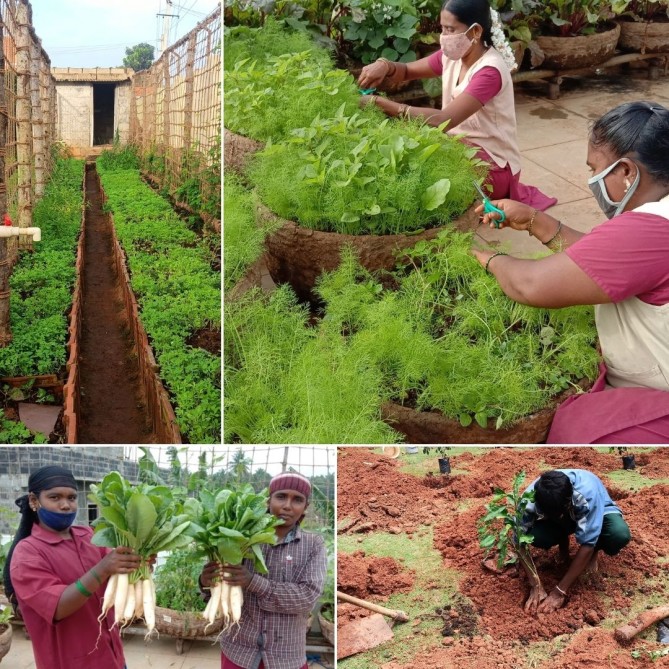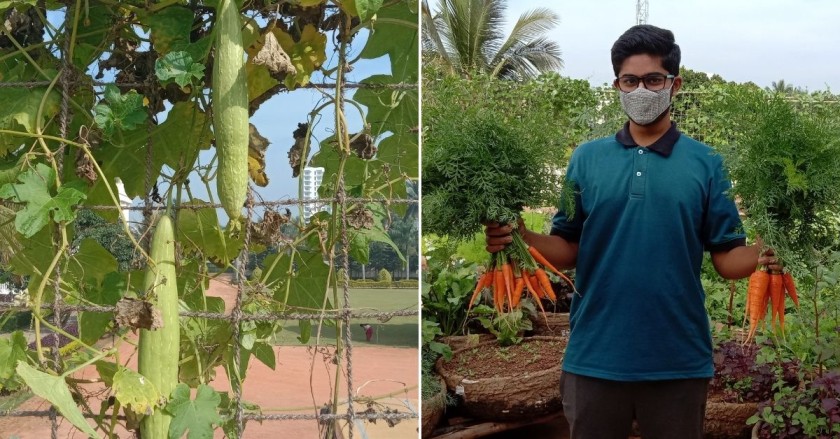When people were confined to their houses during the lockdown, many turned to farming or setting up their kitchen or terrace garden, to kill their boredom or ‘be productive’. It was the same for Suseela Santhosh, director of Vishwa Vidyapeeth school in Bengaluru.
She saw an opportunity in the vacant campus that once bustled with children and turned it green by setting up an organic farm with the help of the teaching and the non-teaching staff.
“The pandemic changed a lot of things. The classes were moved online and without children, many of our non-teaching staff like canteen workers, bus drivers, ayahs (helpers) and cleaners were left with no work and as they didn’t have their routine jobs,” Suseela tells The Better India.
She adds, “We had a small setup of an organic farm in the school, which we decided to expand. That way the staff would be occupied and we would have developed a bountiful farm. Some of them were familiar with farming and others put in the effort to learn.”
Other than the non-teaching staff, Suseela says that the teachers were also excited to be a part of the initiative. “We are all together in this. So, we decided to continue this initiative even after the lockdown was lifted. Now we grow several vegetables in rotation, as per the seasons. We grow fruits like papayas, bananas, and we also maintain a garden with over 40 herbs,” she adds.

The organic farm spreads across the campus. It occupies the huge kitchen terrace of the school, the backyard and the empty spaces between the buildings. They also set up compost pits turning the dead leaves into manure. “We also used the harvested rainwater and the greywater from the kitchen for farming. Additionally, a water channel inside the campus was used to grow over 200 banana plants,” says Suseela.
The school has over 1,400 students from nursery to higher secondary classes. As a part of their food programme, they distribute free food to their students and all staff members.
Suseela says, “The farm now produces roughly around 35-40 kg produce per month. This is used in the school kitchen itself. We make food for the children and the staff and provide them with breakfast and lunch on the campus. The rest of the food is being distributed to the nearby apartments and among some of our staff,” she explains.
“Before reopening the school, we used our produce to cook food and distribute it among the working staff. But eventually, the word spread and we started getting requests to supply food for COVID patients in isolation. So we started distributing it to them at nominal charges. We also supplied free food to several NGOs and frontline workers,” she adds.

The children who came back to school after the lockdown were introduced to this green initiative and are very much part of it. “This is now part of our curriculum. We are involving all our students in the farming activities so that they will also develop a kind of responsibility and will aspire to be self-sufficient,” she says.
“Schools shouldn’t be a place where we deliver knowledge only through textbooks. We should prepare them to face any kind of adversities and mould them in such a way that they will adapt to any situation. I feel this initiative will inculcate such values in them,” concludes Suseela with. a smile.
(Edited by Yoshita Rao)
No comments:
Post a Comment